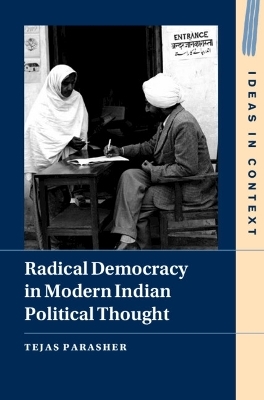
Radical Democracy in Modern Indian Political Thought
Seiten
2023
Cambridge University Press (Verlag)
978-1-009-30559-4 (ISBN)
Cambridge University Press (Verlag)
978-1-009-30559-4 (ISBN)
Drawing on figures ranging from Gandhi to the leaders of the Indian socialist movement, Radical Democracy in Modern Indian Political Thought explores the diversity of political futures imagined at the end of the British Empire and reinterprets the history of representative democracy in South Asia.
Between the 1910s and the 1970s, an eclectic group of Indian thinkers, constitutional reformers, and political activists articulated a theory of robustly democratic, participatory popular sovereignty. Taking parliamentary government and the modern nation-state to be prone to corruption, these thinkers advocated for ambitious federalist projects of popular government as alternatives to liberal, representative democracy. Radical Democracy in Modern Indian Political Thought is the first study of this counter-tradition of democratic politics in South Asia. Examining well-known historical figures such as Dadabhai Naoroji, M. K. Gandhi, and M. N. Roy alongside long-neglected thinkers from the Indian socialist movement, Tejas Parasher illuminates the diversity of political futures imagined at the end of the British Empire in South Asia. This book reframes the history of twentieth-century anti-colonialism in novel terms – as a contest over the nature of modern political representation – and pushes readers to rethink accepted understandings of democracy today.
Between the 1910s and the 1970s, an eclectic group of Indian thinkers, constitutional reformers, and political activists articulated a theory of robustly democratic, participatory popular sovereignty. Taking parliamentary government and the modern nation-state to be prone to corruption, these thinkers advocated for ambitious federalist projects of popular government as alternatives to liberal, representative democracy. Radical Democracy in Modern Indian Political Thought is the first study of this counter-tradition of democratic politics in South Asia. Examining well-known historical figures such as Dadabhai Naoroji, M. K. Gandhi, and M. N. Roy alongside long-neglected thinkers from the Indian socialist movement, Tejas Parasher illuminates the diversity of political futures imagined at the end of the British Empire in South Asia. This book reframes the history of twentieth-century anti-colonialism in novel terms – as a contest over the nature of modern political representation – and pushes readers to rethink accepted understandings of democracy today.
Tejas Parasher is Assistant Professor of Political Theory at the University of California, Los Angeles. He received his Ph.D. from the University of Chicago in 2019 and was formerly Junior Research Fellow in Political Thought and Intellectual History at King's College, University of Cambridge.
1. Popular sovereignty and the end of empire; 2. 'The genius of the people': The 1923 Constitution of Mysore; 3. 'A vast subterranean democracy': Pluralism in the 1920s; 4. 'A living union': The project of Gandhian democracy; 5. Representation, popular sovereignty, and the Indian founding; 6. 'Towards total revolution': the aftermath of independence; 7. Conclusion: The challenge of representative democracy; Bibliography; Index.
| Erscheinungsdatum | 17.07.2023 |
|---|---|
| Reihe/Serie | Ideas in Context |
| Zusatzinfo | Worked examples or Exercises |
| Verlagsort | Cambridge |
| Sprache | englisch |
| Maße | 152 x 236 mm |
| Gewicht | 450 g |
| Themenwelt | Geisteswissenschaften ► Geschichte ► Regional- / Ländergeschichte |
| Sozialwissenschaften ► Politik / Verwaltung ► Staat / Verwaltung | |
| ISBN-10 | 1-009-30559-X / 100930559X |
| ISBN-13 | 978-1-009-30559-4 / 9781009305594 |
| Zustand | Neuware |
| Informationen gemäß Produktsicherheitsverordnung (GPSR) | |
| Haben Sie eine Frage zum Produkt? |
Mehr entdecken
aus dem Bereich
aus dem Bereich


